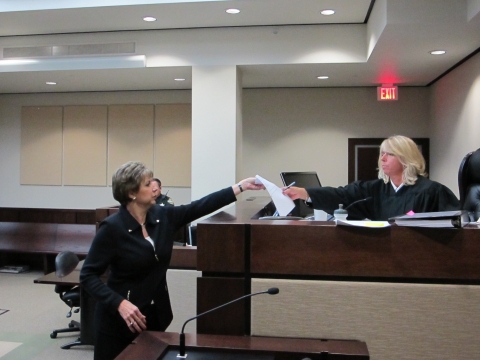CUEE’s paid expert from Chattanooga,
Steve Prigohzy, started and ran a magnet school in Chattanooga,
much like the one in Troup County that is
still causing extra costs and consternation eighteen years after unification.
Prigohzy’s school also used prison labor to avoid spending on local labor.
After reading Barbara Stratton’s piece about
Steve Prigohzy screening a movie about magnet schools,
I wondered, who is this Steve Prigohzy, anyway?
CUEE never showed us his resume, as near as I can tell,
and they’re a private organization, so they don’t have to.
But his tracks are all over the Internet.
Cynthia M. Gettys and Anne Wheelock
wrote for The New Alternative Schools in September 1994,
(Volume 52, Number 1, Pages 12-15)
Launching Paideia in Chattanooga,
 With the board’s approval and support from the Lyndhurst Foundation,
a committee outlined the necessary steps to develop a Paideia school
for Chattanooga students. First, the group hired Steve Prigohzy as the
school’s planner, promoter, and educational leader. Prigohzy looked for
teachers who were lifelong learners themselves. “I would ask teachers
to talk to me about a book they were reading that I shouldn’t miss. I
wanted people who were acting out their curiosity about the world,” he
said. Prigohzy also sought teachers whose appreciation for discourse would
sustain the school as a community of learners. Limited public confidence,
especially in the city’s middle schools, influenced the planning.
With the board’s approval and support from the Lyndhurst Foundation,
a committee outlined the necessary steps to develop a Paideia school
for Chattanooga students. First, the group hired Steve Prigohzy as the
school’s planner, promoter, and educational leader. Prigohzy looked for
teachers who were lifelong learners themselves. “I would ask teachers
to talk to me about a book they were reading that I shouldn’t miss. I
wanted people who were acting out their curiosity about the world,” he
said. Prigohzy also sought teachers whose appreciation for discourse would
sustain the school as a community of learners. Limited public confidence,
especially in the city’s middle schools, influenced the planning.
They must have liked him, because he was hired as its principal,
according Jessica Penot and Amy Petulla in
Haunted Chattanooga,
Continue reading →  Campus authorities tried getting students to move away from the University
Center where
Governor Nathan Deal was having a luncheon.
The students stood their ground.
Campus authorities tried getting students to move away from the University
Center where
Governor Nathan Deal was having a luncheon.
The students stood their ground.









